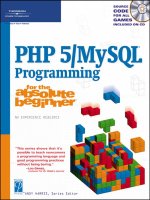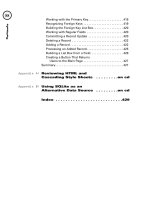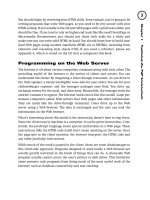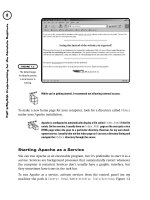PHP 5 e-commerce Development- P43 potx
Bạn đang xem bản rút gọn của tài liệu. Xem và tải ngay bản đầy đủ của tài liệu tại đây (324.91 KB, 5 trang )
Chapter 7
[ 193 ]
On-site payment method
The on-site payment method is the most professional way to allow online payments.
Advantages Disadvantages
Keeps the customer on-site If we store the payment details,
there are a number of security
considerations, and PCI-DSS
audit may be required
Generally, recurring billing can be
done with this method
Requires an SSL certicate to be
installed on the server, which in
turn requires some additional
development, and a static IP
address for the website
Confirmation
At some point, we must go from a collection of products in a customer's basket, to an
order stored in our database. This should be done at this stage, after the customer has
conrmed the contents of their basket, and the other options (which can be changed
later if required), the basket contents should be transferred into an order.
Once the customer has reviewed their order, a simple link or button should be
presented, which once clicked, converts the basket contents into a new order in
the system.
Payment details
As the customer has now conrmed their order and the order details, they should be
presented with payment details:
For ofine payments this may be a postal address, a reference number, a
name to make checks payable to, and instructions.
For off-site online payment methods, this will be a link or a button to the
off-site payment gateway, such as PayPal.
For on-site online payment methods, the page must be securely encrypted,
and contain relevant text boxes for the customer to enter their card details.
This may also require a separate address eld, for their billing address,
unless we implement that elsewhere.
•
•
•
This material is copyright and is licensed for the sole use by jackie tracey on 23rd February 2010
953 Quincy Drive, , Brick, , 08724
The Checkout and Order Process
[ 194 ]
Payment made
The payment should then be made for the order; this should either be the
customer posting a check, entering their card details, or paying through a
service such as PayPal.
Order processed
Once payment has been made, the order should be marked as "pending dispatch";
this would either be done automatically when card details are veried or when
an off-site gateway returns a successful notication, or manually when the
administrator receives a check and marks it as pending dispatch. Generally, we
would want to automatically e-mail the customer to conrm the payment was
successful and the order is being fullled; the administrator should also be informed
allowing them to fulll the order. Once posted, the order should be updated to
reect this and the customer informed, potentially with a custom message (perhaps
with a tracking number for the shipping provider).
Other points of note
In addition to the order process we have established in this chapter so far, there are
some other considerations we must keep in mind while implementing the order
process; these include:
We should make the ability to move back and forth between stages in the
process seamless for customers. This means that if the customer wishes to
go back and make a change to their order information, or conrm some
information, they can do so easily, without having to start at the beginning
of the order process.
Authentication should be seamless—either the login form should also be
the rst section of a registration process for new customers, or the page
shown to the customer should contain both a form for logging in and a form
for registering to use the site. This reduces potential barriers between the
customer and them placing an order successfully.
•
•
This material is copyright and is licensed for the sole use by jackie tracey on 23rd February 2010
953 Quincy Drive, , Brick, , 08724
Chapter 7
[ 195 ]
Summary
In this chapter, we have looked in detail at the order process on a number of popular,
successful e-commerce websites, and discussed their methods. We have used these
observations to detail a process of our own, which we will use for our framework.
This now gives us a clear plan of what we have left to do:
Implement shipping and tax handling
Implement payment processing
Implement delivery address handling
Implement order processing, fulllment, and administration
Implement voucher code discount provisions
We can now continue developing our store, with a better understanding of what we
are going to do, and why.
•
•
•
•
•
This material is copyright and is licensed for the sole use by jackie tracey on 23rd February 2010
953 Quincy Drive, , Brick, , 08724
This material is copyright and is licensed for the sole use by jackie tracey on 23rd February 2010
953 Quincy Drive, , Brick, , 08724
Shipping and Tax
After discussing the checkout and order process in detail in the previous chapter, we
now need to start building the functionality for this. In this chapter you will learn:
How to calculate shipping costs based on:
Product
Weight
Location
"Shipping rules"
About third-party shipping APIs
How to integrate shipping and tracking notications on orders
How to integrate tax costs into our system
Shipping
Shipping is a very important aspect of an e-commerce system; without it customers
will not accurately know the cost of their order. The only situation where we
wouldn't want to include shipping costs is where we always offer free shipping.
However, in that situation, we could either add provisions to ignore shipping costs,
or we could set all values to zero, and remove references to shipping costs from the
user interface.
Shipping methodsmethods
The rst requirement to calculate shipping costs is a shipping method. We may wish
to offer a number of different shipping methods to our customers such as standard
shipping, next-day shipping, International shipping, and so on.
•
°
°
°
°
•
•
•
This material is copyright and is licensed for the sole use by jackie tracey on 23rd February 2010
953 Quincy Drive, , Brick, , 08724









